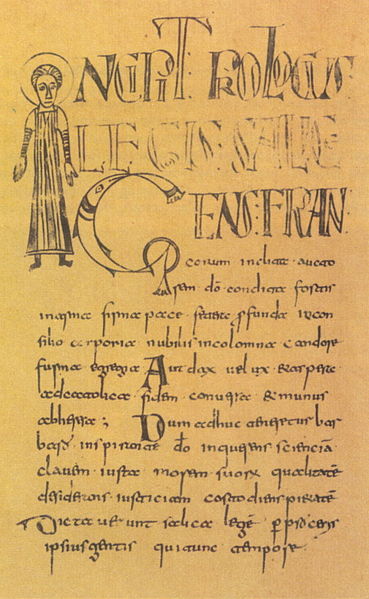By Anatoly Liberman
I will begin with a short summary of the previous post. In English texts, the noun baron surfaced in 1200, which means that it became current not much earlier than the end of the twelfth century. It has been traced to Semitic (a fanciful derivation), Celtic, Latin (a variety of proposals), and Germanic. The Old English words beorn “man; fighter, warrior” and bearn “child; bairn” are unlikely sources of baron. Latin vir “man; husband” would not have become baron for phonetic reasons. The same holds for some other proposed Latin v-words. However, in Latin, baro1 “fool; simpleton” and baro2 “a free man” have been attested. As the putative etymons of baron both pose problems. Baro1 meant “fool” and “a strong, muscular man; a man lacking polish, someone from a province,” while baro1 emerged only in the Frankish law code (Lex Salica) known from early medieval manuscripts. The laws, even though they codified the life of a Germanic tribe, were written in Latin, so that there is no certainty that baro2 is a genuine Latin noun: it could be a Latinized Germanic legal term the scribes preferred to leave untranslated. It is hard to decide whether in dealing with Latin baro1 we have two different words (“fool” and “a strong, unpolished man”) or two meanings of the same word. If the second treatment of baro is to be preferred, then what was the way of development: from “fool” to “a strong man” or from “a strong man” to “fool”? The German linguist Franz Settegast believed that only the second alternative should be considered and derived baron from baro1, but he said nothing definite on the history of its Germanic homonym. In his opinion, baro of Lex Salica might be a different word. This is approximately where I left off last week.
As regards the fortunes of Classical Latin baro, Settegast’s idea is reasonable. He believed that, although thanks to Cicero “fool” is the best-remembered sense of baro, it is not the original one. More probably, he suggested, the word arose with the meaning “a strong man” and later acquired the negative connotations “hillbilly, rough person,” as opposed to someone who learned good manners in the capital, was urbane, and depended on his intellect rather than physical strength. Some analogs Settegast cited missed the point, but for his main argument one can find ample confirmation. Thus, in animal folklore, brawn never goes together with brain. The trickster of animal tales is usually a smart weakling: the cat, the coyote, Brer Rabbit, and the rest. Even the fox, though certainly not a puny creature, is smaller and weaker than the wolf and the bear. The trickster’s dupes are the wolf and the bear.

The Gipsy baron of Johann Strauss
As usual in such cases, Settegast had to depend on one or more missing links. He assumed that baro developed in two ways: in one direction it allegedly went from “a strong man” to “fool” and in the other to “*fighter, *warrior, *man” and further to “baron.” The senses I marked with asterisks have not been recorded. Yet many influential specialists in the history of Latin and the Romance languages accepted Settegast’s reconstruction. Despite the consensus the pendulum soon swung in the opposite direction, and etymologists returned to the idea that baron could not be related to a word meaning “fool; simpleton” and traced it to Old High German baro, as we know it from Lex Salica. To support this derivation, one had to offer a plausible etymology of German baro, and Settegast’s opponents came up with the following. There is an Old Icelandic verb berja “to strike,” a cognate of Latin ferio “to strike; kill”; its reflexive form berja-sk means “to fight” (that is, “to exchange blows”). Old High German baro emerged in this scheme as “fighter,” an ideal semantic etymon of baron. However, Icelandic did not have the noun bero “fighter.” Only Old High German bero is known, but it is related to the verb beran “bear; carry” and means “carrier, porter.” It has nothing to do with Icelandic berja ~ berjask. Baro “fighter” ended up with the single support of the nonexistent noun bero “fighter” and nouns like Icelandic bardagi “battle.”
The derivation of baron from Germanic found the support of practically all later etymologists except, predictably, Settegast, who mounted a spirited defense of his old idea, but this time his voice was not heard. His reconstruction did not illuminate every dark corner (remember the asterisked forms, cited above!), but the Germanic reconstruction fares even worse. Settegast refuted the main objection to his theory (“baron” cannot go back to “fool”; of course, it cannot), so that there is no need to repeat the same seemingly crushing counterargument again and again. If Latin baro yielded not only “fool” but also “fighter,” from “a strong man,” then baro, as it occurs in Lex Salica, is a Latin noun.
In my rejection of the Germanic etymology of baron from berjask I am not quite alone. Pierre Guirot, a French etymologist who supports many untraditional solutions, returned to the idea that baron originated in Latin. Regrettably, he offered his opinion without offering detailed proof. Harri Meyer, a distinguished linguist but another maverick of Romance philology, tended to agree with Guirot. Clearly, the tide has not turned. But it does not follow that we have only two choices: either to derive baron from Latin baro or to trace it to Germanic berjask. There is at least one more possibility.
Etymology is a tale of eternal return. Old conjectures tend to resurface in a new light and make us look at forgotten or discarded ideas with interest and even respect. In the early sixties of the nineteenth century, the question was asked whether baron could be a continuation of some word like German Wehrmann “soldier.” Obviously, -on in baron and -mann in Wehrmann are not related. But what about Wehr “defense”? About seventy years later George G. Nicholson had an idea that returned him to Wehr, though, of course, he had no knowledge of an old exchange in Notes and Queries. He paid special attention to the common use of Old French baron with the genitive (“the baron of…”), for example, in li bon baron de France “the good defender, protector of France.” The English equivalent of the Latin phrase barones quinque portuum (which alternated with custodes quinque portuum) is Wardens of the Cinque Ports. In Old French, the word baron was applied to the king, saints, and even Jesus Christ, so that the sense “protector, defender” cannot be called into question.
Nicholson analyzed Old High German words whose English cognates are aware, beware, warn, ward, and warden (their root is war-), and derived baron from the reconstructed Romance form waronem-. The Romance languages did borrow the Germanic root war-, as testified, among others, by guardian, a doublet of warden. Waronem- “protector” would explain the well-attested sense of baron “man.” As mentioned in the previous post, the alternation w/v- ~ b- poses no insurmountable difficulties. Even the native Latin speakers noticed it, and a doublet of Spanish baron is varón “man, male.” The Portuguese form is similar.
Nicholson’s etymology invites serious consideration. Settegast was probably right in not considering “fool” the original sense of Latin baro, but he had a hard time of tracing the path from “a muscular man” to “fighter,” “man; husband,” and, finally, to “baron.” We may also concur with him that Italian barone “rogue” and barone “baron” continue the same Latin etymon. The association between baron and the cognates of Icelandic berjask does not look promising, and one should treat without much confidence the often-repeated statement that Latin had the word baro before the arrival of the Franks. It probably did not. More likely, baron is a Romance adaptation of Germanic waronem-. And couldn’t this coinage (baron) spread to the Celtic-speaking world? Old Irish bár “wise man, sage; leader; overseer,” especially “overseer,” resembles “protector,” the more so because one of the glosses of barons was Latin custodes (the plural of custos). In Ireland, the word might enjoy a shady existence as a legal foreignism, and, presumably, that is why it never occurred in native literature. If such was the state of affairs, barons emerged as protectors and “custodians.” The way from “protector” to “man; husband; fighter” is short. Thus, baron may be, after all, a Germanic word, but going back to an etymon quite different from the one mentioned in our dictionaries.
Anatoly Liberman is the author of Word Origins And How We Know Them as well as An Analytic Dictionary of English Etymology: An Introduction. His column on word origins, The Oxford Etymologist, appears on the OUPblog each Wednesday. Send your etymology question to him care of [email protected]; he’ll do his best to avoid responding with “origin unknown.” Subscribe to Anatoly Liberman’s weekly etymology articles via email or RSS.
Subscribe to the OUPblog via email or RSS.
Subscribe to only language articles on the OUPblog via email or RSS.
Image credit: Alexander Girardi, austrian actor; seen in Johann Strauss II: The Gypsy Baron. Portrait Collection Friedrich Nicolas Manskopf at the library of the Johann Wolfgang Goethe-University Frankfurt am Main. ID: S36_F08653. Public domain via Wikimedia Commons.
The post A globalized history of “baron,” part 2 appeared first on OUPblog.



 More promising is the Latin noun baro (genitive baronis, accusative baronem), which looks like a possible source of baron. However, the history, and not only the etymology, of baro is another
More promising is the Latin noun baro (genitive baronis, accusative baronem), which looks like a possible source of baron. However, the history, and not only the etymology, of baro is another